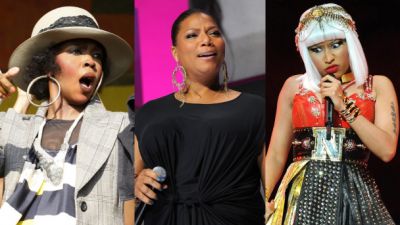
 Ladies First: Female MCs in Hip Hop from the Past to the Present
Ladies First: Female MCs in Hip Hop from the Past to the Present
RnB/Hip Hop | Wednesday 4th September 2013 | Gbig_Mike
Hip-hop, like rock, underground dance music and many other genres, has traditionally been an incredibly male dominated genre. As a result, one could make the mistake that rap music is largely made by and for men, however, there have been some notable exceptions to this rule throughout Hip Hop history who have been an important part of the genre’s feminine minority.
The early years of Hip Hop were a very healthy time for the participation of women in this, then new form of musical expression. Female duo Salt-N-Papa had one of rap’s earliest crossover hits with the now classic single ‘Push It’ in 1988, which even reached number 2 in the British charts. The late 1980s is an era dubbed as Hip Hop’s Golden age, with one of the defining characterestics of the music of this time being the exploration of socially conscious themes and the embrace of afro-centric ideals and visuals and this trend was not solely limited to the male rappers. Both MC Lyte and Queen Latifah released music during this period which reflected those themes, with both releasing albums to considerable critical acclaim towards the end of the decade, Queen Latifah’s 1989 effort All Hail The Queen, in particular, being propelled to commercial success due, in part, to the feminist anthem ‘Ladies First’.
By the mid-90s the sounds and themes explored within the mainstream in rap music veered away from the socially conscious flavours that dominated during the late-80s, as these themes were eschewed in favour of the harder, more aggressive lyric stylings of gangsta rap, in which many male rappers at the time assumed aggressive, violent and intimidating personas. As a reflection of this change, the female rappers who came about in this era such as Lil’ Kim, Foxy Brown and Trina tended to embrace hyper-sexualised lyrics and likewise marketed themselves in an incredibly sexualised manner, in a trend that can be seen as mirroring the hyper-masculinity that was present in the Hip Hop of the moment. Whilst the men of the gangsta rap such as Dr Dre, Biggie and Tupac created what has gone down as some of the defining music in the pantheon of classic rap, there is a case that the over-sexualisation utilised by the women of this era prevented them from being seen as serious artists and more as objects of sexual desire.
As the 90s progressed, however, there became an increasing amount of female rappers who were able to attain both commercial and critical success again. The barrier was broken by none other than Lauryn Hill, who after her standout performances on the classic Fugees album The Score released her solo debut The Miseducation of Lauryn Hill in 1998. The album was a success of colossal proportions, receiving universal acclaim, going 8x platinum in the States and winning 5 Grammies, and although its sound was primarily rooted in neo-soul, it retained a heavy hip-hop influence and opened the flood gates for female rappers making quality music in the mainstream again, as evidenced by the rise of rappers such as Eve, Missy Elliott and the UK’s very own Ms. Dynamite
However, as the years went on and Lauryn Hill went into self-imposed exile from the music industry, Eve focused more on an acting career, Missy Elliott privately battled with Graves’ disease and Ms Dynamite putting out less on music to focus on her young family, the presence of women in the mainstream of hip hop became somewhat lacking again. That was until the rise of Nicki Minaj as part of Lil Wayne’s label ‘Young Money’ in 2010. While Nicki Minaj has been hugely successful, a common criticism is that her output has been too pop orientated, with her phenomenal guest showing on Kanye West’s track ‘Monster’ showing that she might be compromising the considerable lyrical talent that she undoubted possesses in order to compete in the current musical landscape. Nonetheless, Ms. Minaj’s success has heralded the rise of a new host of female rappers such as Iggy Azalea, Azealia Banks and Angel Haze. While it remains to be seen whether this new group of artists can match the commercial and critical success of the female rappers that preceded them, it is nonetheless refreshing to once again hear some voices of the fairer sex in hip hop music.
